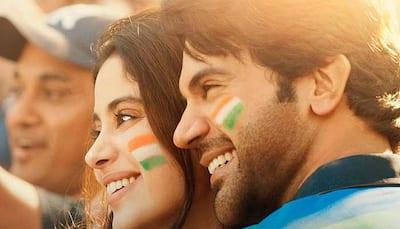
Mumbai: At a cricket stadium in Jaipur, the excitement reaches a fever pitch as a nail-biting match unfolds. With a few balls left, two batters are at the crease. The crowd anticipates a thrilling climax as both players strive to score the final runs needed for victory.
Mahendra, one of the batters, urges his partner to avoid playing hero and follow his lead for the winning shot. Ignoring Mahendra’s advice, the partner hits consecutive fours, much to Mahendra’s frustration. In a fit of rage, Mahendra purposefully allows his partner to get run out, only to fail himself on the very next ball, getting caught by a fielder.
Mahendra, also known as Mahi (played by Rajkummar Rao), is a man of ambition but limited talent—a mediocre player with lofty aspirations. As an ardent fan of the legendary cricketer Mahendra Singh Dhoni, Mahendra lacks the discipline and charisma of his idol, both on and off the field. Discontent with his mundane job at his father’s (Kumud Mishra) sports goods shop, Mahendra dreams of making it big in cricket.
After repeatedly failing to secure a spot in the state cricket team, Mahendra is at a crossroads. His pragmatic coach (Rajesh Sharma) sees no future for him in cricket and suggests he turn to coaching instead. Upset, Mahendra storms off, refusing to heed the advice.
Adding to his woes, Mahendra’s father, fed up with his son’s lack of career focus, insists he take over the family business. He also arranges Mahendra’s marriage to Dr. Mahima Sharma (Janhvi Kapoor), a professional well-loved by her parents (Purnendu Bhattacharya and Yamini Das). Mahendra’s father exaggerates Mahendra’s accomplishments to impress Mahima’s family.
The subsequent day, guilt consumes Mahendra. He confesses to Mahima that his father’s claims were fabricated. Touched by his honesty, Mahima falls for him, appreciating his candor. Intriguingly, both share the nickname Mahi, signifying the emergence of ‘Mr and Mrs Mahi’.
As their relationship blossoms, so does their mutual love for cricket. Mahima, a naturally gifted player, is encouraged by Mahendra to pursue her cricketing dreams. Despite her reservations about abandoning her career in medicine, Mahima eventually agrees to focus on cricket, fuelled by her husband’s encouragement.
.
Facing the challenge of quitting her profession, Mahima grapples with her father’s aspirations for her medical career. After thoughtful consideration, she yields to Mahendra’s persuasion. Their decision causes a stir among both families as the couple commits to cricket with full resolve.
Eager to coach his wife, Mahendra dedicates himself to training Mahima, who hesitantly begins her transformation from doctor to cricketer. With state-level selections just six months away, time is of the essence. The duo works relentlessly, embracing the rigorous preparation required for Mahima’s success.
However, as Mahima’s cricketing prowess shines and she becomes a media darling, Mahendra’s insecurities deepen. Feeling overshadowed and unappreciated, Mahendra’s behavior deteriorates. Tension escalates, affecting Mahima’s form on the field, which even leads to criticisms from selectors for her declining performance.
Such emotional turmoil is not uncommon in marriages steeped in professional rivalry. This film, attempting to blend sports with familial strife, ultimately seems scattered in its focus. Mahendra’s jealousy and dwindling self-assurance culminate in significant relationship strain, portraying a character wrestling with his insecurities and personal demons.
Rajkummar Rao, portraying Mahendra, puts forth a sincere effort to meet the script’s demands, though his performance occasionally veers into overdramatization. Limited by the script’s constraints, Rao’s natural exuberance is somewhat stifled, although he remains compelling.
Conversely, Janhvi Kapoor’s genuine portrayal of Mahima adds depth to her character. Her expressions of uncertainty and internal conflict resonate well, reframing her transition from medicine to cricket with credible emotion. Her physical portrayal of a cricketer, however, reveals her inexperience in the sport, despite her persistent effort.
Veteran actress Zarina Wahab shines briefly but significantly in her limited screen time, leaving viewers wishing for more of her presence in pivotal scenes. Talented actor Kumud Mishra also faces limitations due to his narrowly sketched character, missing deeper explorative moments.
The film’s technical aspects, from Anay Goswami’s cinematography to the multifaceted musical score by Aadesh Shrivastava and others, effectively support the movie’s atmosphere. Despite these merits, the film’s overall impact is muted, raising questions about why Dharma Productions, known for its high standards, ventured into producing such an averagely executed film. With an IANS rating of **1/2, “Mr & Mrs Mahi” tries to hit multiple targets but ultimately lands unremarkably between genres.












